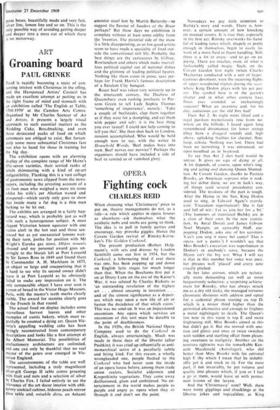ART
Groaning board
PAUL GRINKE
Food is rapidly becoming a topic of con- suming interest with Christmas in the offing, and the Hampstead Artists' Council has made an excellent attempt at putting us in the right frame of mind and stomach with an exhibition called 'The English at Table, 1700-1970' at the Camden Arts Centre. Organised by Mr Charles Spencer of Art and Artists, it presents a largely visual approach to such essential matters as the Wedding Cake, Breadmaking, and even those desiccated packs of food on which astronauts are obliged to exist. But fortun- ately some more substantial Christmas fare was also to hand for those in training for the big day.
The exhibition opens with an alarming display of the complete range of Mr Heinz's fifty-seven varieties, their serried ranks of labels shimmering with a kind of op-art indigestibility. Flanking this is a vast collage of gastronomic news clipped from the news- papers, including the arresting account of a six foot man who weighed a mere six stone whilst his wife's pet Alsatian waxed and prospered—which surely only goes to show that inside many a fat dog is a thin man barking to be let out.
The exhibits are arranged in a fairly hap- hazard way, which is probably just as well with such a heterogenous subject. A most elegant Victorian lemon squeezer with one victim aloft in the hot seat and three sen- tenced but as yet unexecuted lemons wait- ing their turn, jostles for position with Mr Wright's Eureka gas stoves Objets motives abound and my personal award goes un- erringly to the biscuit left at Port Leopold by Sir James Ross in 1849 and found there by Commander A. H. Markham in 1873, an object so large and unappetising that it is hard to see why its second owner didn't leave it at_ Port Leopold as he obviously failed to make any impression on it. The only comparable object I have ever seen is a crust of bread in the Victor Hugo Museum, Paris, with the master's teeth marks clearly visible. The award for stamina clearly goes to the French in that round.
The actual food on display includes some marvellous harvest loaves and other examples of exotic bakery, which must re- gretfully be counted a dying art. Queen Vic- toria's appalling wedding cake has been lovingly reconstructed from contemporary descriptions and looks like a first attempt at the Albert Memorial. The possibilities of confectionery architecture are unlimited, and one can only be thankful that no real master of the genre ever emerged in Vic- torian England.
The accoutrements of the table are well represented, including a truly magnificent silver-gilt George II table centre groaning with fruit and nuts and a selection of silver by Charles Fox. I failed entirely to see the relevance of the art decor interior with obli- gatory cocktail cabinet, hideous peach mirror glass table and, mirabile dictu, an Ashanti ancestor stool lent by Martin Battersby—to suggest the flavour of Sanders of the River perhaps? But these days no exhibition is complete without at least some oddity from tile 'twenties. The pictorial side of the show is a little disappointing, as so few good artists seem to have made a speciality of food out- side the conventional still life. Probably the best things are the caricatures by Gillray, Rowlandson and others which make marvel- lous political capital out of national dishes and the gluttony of leading political figures. Nothing like them exists in prose, save per- haps for Frank Harris's famous description of a flatulent City banquet.
Roast beef was taken very seriously up to the nineteenth century, the Duchess of Queensbury even rushing posthaste to Par- sons Green to tell Lady Sophia Thomas 'something of importance', namely : 'Take a couple of beefsteaks, clap them together as if they were for a dumpling, and eat them with pepper and salt: it is the best thing you ever tasted! I could not help coming to tell you this'. She then shot back to London, mission accomplished. Who would be bold enough now to say, with the writer in Household Words, 'Beef makes boys into men. Beef nerves our navvies'? Perhaps the organisers should have included a side of beef to remind us of vanished glory.














































 Previous page
Previous page